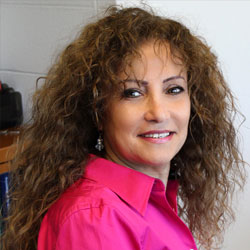SIS Professor Dania Bilal Gets IMLS Grant to Create Institute on Artificial Intelligence
 SIS Professor Dania Bilal, along with collaborators at two other universities, received a $208,142 Institute of Museum and Library Services grant to create the IDEA (Innovation, Disruption, Enquiry, Access) Institute on Artificial intelligence (AI).
SIS Professor Dania Bilal, along with collaborators at two other universities, received a $208,142 Institute of Museum and Library Services grant to create the IDEA (Innovation, Disruption, Enquiry, Access) Institute on Artificial intelligence (AI).
“We’re very excited about receiving this grant, as you know IMLS is very competitive. AI is one of the top three trends in the field. Yet, only 5 percent of research libraries have leveraged AI technology. AI adoption has been slow in libraries, suggesting there are not enough AI experts in the library and information field,” Bilal said. “The main objective of this grant is to educate the next generation of leaders in AI in libraries who are capable of increasing awareness, adoption and application of AI solutions in library and information environments.”
The project team on this grant is Bilal, as principle investigator, and two co-principle investigators, Clara M. Chu, Mortenson Distinguished Professor and Director of the Mortenson Center for International Library Programs at the University of Illinois at Urbana-Champaign, and Soo Young Rieh, Professor and Associate Dean for Education at the School of Information at the University of Texas at Austin.
The IDEA Institute on AI consists of a one-week intensive, applications-oriented, evidence-based, and interactive training for two cohorts of information science professionals. The main purpose is for those professionals to walk away from training with knowledge to start planning, evaluating, and implementing AI solutions at their institutions. The first IDEA Institute will be hosted at the University of Tennessee, Knoxville, in 2021, and the second will be hosted at the University of Texas at Austin, in 2022.
“Our priority in this project is to recruit and create two cohort of fellows who will represent diverse socio-demographic backgrounds, types of positions, types of libraries, and capacities of implementing AI in their workplace,” Bilal said.
Each cohort will consist of 15 IMLS-funded fellows and five self-funded fellows, resulting in 40 participants over the course of two years. Curriculum will be developed by the project team in collaboration with four leading AI experts who will serve in the dual roles of Board members as well as Institute instructors. The Board members are: Catherine Nicole Coleman, Digital Research Architect at Stanford Libraries; Jason Griffey, Director of Strategic Initiatives at NISO and a current affiliate at metaLAB at Harvard University; Myung-Ja Han, Professor and Head of Acquisitions & Cataloging Services, University of Illinois at Urbana-Champaign Library; and Craig Boman, Software Engineer at Mile Two.
Bilal herself will also be an instructor for the Institute in UX methodology. A preliminary curriculum was created as part of the grant proposal, and Bilal said the project team is already diving right into the process of fully fleshing out a curriculum that will incorporate conceptual, technical, social, and applied aspects, including ethical issues of AI.
Once the two-year project is completed, the Institute will live on through ASIS&T. The American Library Association (ALA) is also a supporting organization for the project through its Center for the Future of Libraries.
“Having the support of ASIS&T and ALA is huge, and very important,” Bilal said.
There are many ways that libraries and information organizations can implement AI into their processes, and Bilal is excited to see what the future IDEA Institute fellows will do at their workplaces. She is hoping this project will bring awareness to the field around what AI can do, and how practitioners can harness its capabilities.
“By bringing awareness about AI as being transformative rather than focusing on it as disruptive and costly, we need to train people – people who can work with it and see what they can do with this technology, while recognizing some of the ethical issues and how to minimize these issues,”Bilal said.
The training was designed to be one week long because professionals are often too busy to take a course for an entire semester, or even to take a six-week workshop; Bilal also said some of the AI courses available are quite advanced, whereas this training is more accessible and only requires applicants to have a basic knowledge of programming languages.
“AI is transformative and has huge advantages. This AI curriculum fills a gap in information sciences education and training,” she said.
This project was made possible in part by the Institute of Museum and Library Services, IMLS grant number RE-246419-OLS-20.
